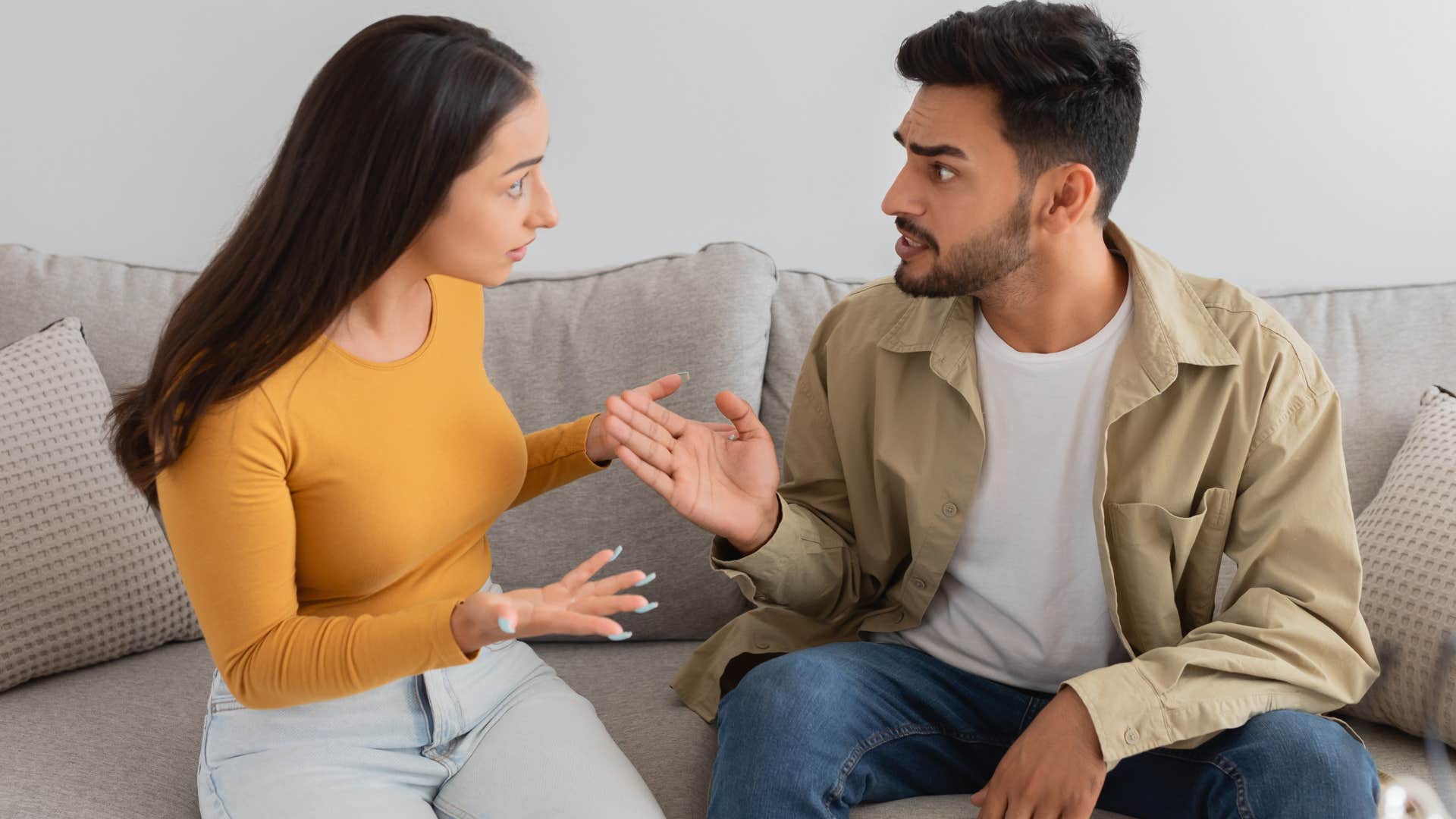11 Things A Good Person Won't Do To Someone They Truly Care About
Good people are empathetic and compassionate to a fault.
 Maria Markevich | Shutterstock
Maria Markevich | Shutterstock Many of us reinforce our healthy connections and relationship with intentional behaviors like open conversations, words of affirmation, and basic empathy. But there are also many things a good person won't do to someone they truly care about that combat against lacking trust and misunderstandings. Many people engage in these unhealthy habits without even realizing it, urging people in their life to feel unheard and unvalued.
By recognizing these habits and acknowledging them in your relationships, you not only empower yourself to set better boundaries and communicate your needs, you give yourself the chance to weed out toxic and unhealthy connections to make space for more fulfilling ones. The basis for every relationship is trust, like a study from Frontiers in Psychology explains, but to cultivate and maintain it, you have to be cognizant of what you're tolerating and how you're being treated.
Here are 11 things a good person won't do to someone they truly care about
1. Consistently break promises
 Perfect Wave | Shutterstock
Perfect Wave | Shutterstock
When other people consistently break their promises in a relationship, whether it's cancelling at the last minute for every plan or sabotaging trust with a shared secret, they're communicating that they don't value their partner, according to psychologist Michelle Gielan.
While they might seem like subtle white lies or poor time management, these small actions can build up, leading to insecure, mistrusting, and resentful connections.
Especially in a healthy relationship, both people need to feel like they can count on each other. When someone breaks promises and communicates this subtle lack of trust, you may be able to forgive them, but you won't forget the negative and uncomfortable emotions these broken commitments spark.
If you can't count on someone to prioritize and make time for you, how can you build a trusting relationship?
2. Gossip behind their back
 La Famiglia | Shutterstock
La Famiglia | Shutterstock
While the practice of gossiping is a common behavior in many people's routines, primarily used to bond with others and even entertain themselves, it can also be a red flag in relationships founded on trust, especially when someone is consistently speaking poorly about someone behind their back.
Typically a habit of an insecure person, according to research from Frontiers in Psychology, attempting to assert their dominance and control over a situation or relationship, gossiping is a quick way to sabotage the trust a healthy relationship needs to function.
While they may be engaged in "gossipy" conversations with friends or exchanging rumors as a way to bond with others — even their own partners — speaking poorly about someone they're close with is one of the things a good person won't do to someone they truly care about.
While specific instances and mistakes do happen, especially fueled by discomfort and resentment in a connection, someone who continues to gossip about you is subtly reminding everyone that they don't value or respect you enough to speak positively when you're not around.
3. Make them work for their attention or love
 Srdjan Randjelovic | Shutterstock
Srdjan Randjelovic | Shutterstock
The healthiest relationships are founded on a sense of trust and commitment. Their unconditional love reassures partners that no matter what, they'll always be there to support and love each other.
Of course, this can be a challenge in itself amid arguments or rough patches in a relationship, but at the end of the day, there's a shared understanding between partners that for as long as they're in a relationship, they'll work to support each other without expecting anything in return.
On the other hand, insecure and controlling relationships often grow toxic in the face of conditional love, where the tenants of their partnership — trust, love, compassion, and support — are only given out on the condition of something in return. Like experts from Hudson Therapy Group explain, conditional love not only sparks feelings of resentment and insecurity in relationships, it encourages people to behave in a certain way to feel appreciated by their partners.
Leveraging conditional love to get what they want is one of the things a good person won't do to someone they truly care about. Instead, they'll love a person for who they are, rather than what they can offer them.
4. Hold a grudge
 Lightfield Studios | Shutterstock
Lightfield Studios | Shutterstock
Resentment, one of the biggest points of tension in many committed long-term relationships, is sparked by small and subtle behaviors like holding a grudge. A good person in a healthy relationship will resolve a conflict and communicate through hardships, but toxic people find power in holding grudges and manipulating their partners by continually holding their mistakes over their heads.
While it takes a secure person in a trusting relationship to forgive, good people understand that they'll never find trust, security, and comfort in their relationships without letting go of grudges and moving forward.
If you're always coming back to the same argument, never truly resolving issues, that could be a sign you need better communication habits in your relationship. Of course, if your partner isn't willing to actually talk about things and would prefer to keep holding them over your head to get what they want, that could be a sign they don't truly care about you.
5. Consistently forget to text back
 Ekateryna Zubal | Shutterstock
Ekateryna Zubal | Shutterstock
While opinions around texting, especially early on in a relationship, tends to be equally coveted and controversial, it's still a form of communication that's important for a lot of people. Especially if consistently texting when you're apart is something a partner has expressed importance in, it's essential to meet their needs in a way that supports each of you in a relationship.
When someone consistently leaves you "on read" or "forgets" to respond, that's a choice and one of the things a good person won't do to someone they truly care about. If they have a busy day, they'll take the time to remind their partner with a text like, "Hey, I have a busy day today, so I might be unresponsive for a bit."
It doesn't take much to remind your partner that you're thinking about them. While meeting their needs and communicating boundaries may take more time and energy, someone who cares about you and your relationship will make the time to do so.
6. Refuse to accept their differing opinions
 Zamrznuti tonovi | Shutterstock
Zamrznuti tonovi | Shutterstock
Many relationships take on resentment because of differing opinions coupled with poor communication. Especially for people with strong opinions and values that they hold closely as a part of their identity or personhood, having a partner who makes them feel heard is important.
However, instead of embodying their boundaries and "deal-breakers" and ending a relationship with someone whose opinions they can't appreciate, toxic people tend to constantly criticize them instead.
Weaponizing their beliefs and constantly arguing, refusing to openly talk about opinions and values in a healthy manner is one of the things a good person won't do to someone they truly care about.
7. Disrespect their boundaries
 Monkey Business Images | Shutterstock
Monkey Business Images | Shutterstock
While it might be hard or uncomfortable to acknowledge in an unstable relationship, a lot of times the discomfort partners feel in a toxic relationship is a result of their boundaries being consistently disregarded or disrespected, according to therapist Kate O'Brien, LCAT.
A healthy partner who truly cares about their spouse will not only take the time to listen and understand boundaries in their relationship, they'll empower themselves to respect them and vice versa. Someone who doesn't value your comfort or health will disrespect your boundaries over-and-over again, but a truly good person with your best interests at heart will empower you to set and reassert them.
8. Avoid checking in and having vulnerable conversations
 Krakenimages.com | Shutterstock
Krakenimages.com | Shutterstock
According to clinical psychologist Matt Boland, avoiding emotions and growing detached in connections isn't just a detriment to relationship fitness, but our own psychological well-being.
From missing out on the empowerment and security of vulnerable conversations in their relationships, to growing resentful, and battling the emotional turmoil associated with repressed emotions, many toxic and detached people struggle to show up for their partners and honestly communicate.
Ironically enough, the same people who avoid vulnerability and open conversations in their relationships tend to be more emotionally sensitive in general, resorting to anger in the face of conflict or consistently having emotional outbursts that sabotage open conversations.
While many of the things a good person won't do to someone they truly care about revolves around basic trust and empathy toward a partner, people who avoid vulnerability and open communication aren't just sabotaging their partners, but themselves as well.
9. Constantly criticize them
 Prostock-studio | Shutterstock
Prostock-studio | Shutterstock
People in healthy relationships often find value in their arguments and growth amid conflict because they're able to communicate when their feelings get hurt. They work together to set boundaries, reassure each other by communicating their needs, and never let an unresolved struggle linger for too long.
With the right communication tools and a foundation of trust, good people avoid criticizing their partners, feeling secure enough to acknowledge mistakes without defensiveness or the need to nag. While other insecure or toxic partners may express their repressed feelings and emotions with hyper-critical behaviors, good people communicate honestly and openly.
While holding people you value accountable and to high standards is important, like experts from the Harvard Business Review suggest, being overly critical on a daily basis to someone looking to you for support and compassion only sabotages the health of a relationship, whether it be professional, intimate, or something else.
10. Make them question the relationship
 fizkes | Shutterstock
fizkes | Shutterstock
It's normal to occasionally question a relationship. Is it what you're looking for? Are they showing up and communicating with you in ways that build trust? Can you rely on them when you're going through a hard time?
It's a part of life to ask yourself these questions, but when you're consistently operating from an anxious mindset, worried about someone's intentions and the stability of your relationship, that could be a sign they don't truly care about you.
Healthy partners and truly good people will spend time, effort, and energy supporting you in a relationship. They will use open conversations, affection, and affirmations to remind you that you're loved, helping to build security and stability in your connection.
It all comes down to a simple phrase that encompasses all relationships: if they wanted to, they would. While the actions and behaviors that cultivate a healthy relationship look different for everyone, making someone feel insecure or anxious about a connection is one of the things a good person won't do to someone they truly care about.
11. Send mixed messages and confusing signals
 Voronaman | Shutterstock
Voronaman | Shutterstock
Like a study published in the Journal of Social and Personal Relationships explains, toxic partners often rely on mixed signals in their relationships to spark self-doubt and anxious behaviors in their partners, encouraging them to adopt unhealthy behaviors like people-pleasing to keep the peace.
An unhealthy and selfish person may say "I love you" to their partner, only to turn around and disrespect them or speak poorly about them behind their back. They may also withhold affection from an intimate partner, urging them to feel insecure or "needy" for asking for their attention.
This cycle of mixed signals and instability only causes resentment in a relationship and it's one of the things a good person won't do to someone they truly care about. Rather than play games and indirectly send messages, a healthy partner will spark open and honest conversations, talking through issues and working together to get back on track.
Zayda Slabbekoorn is a staff writer with a bachelor's degree in social relations & policy and gender studies who focuses on psychology, relationships, self-help, and human interest stories.

